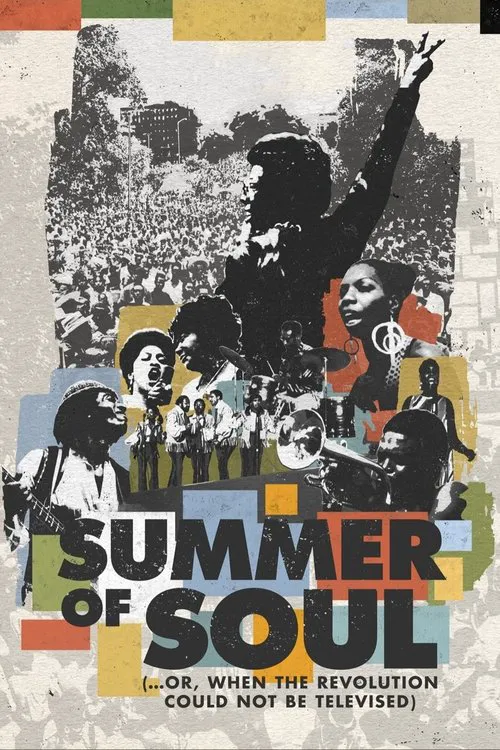Summer of Soul (...Or, When the Revolution Could Not Be Televised)

Plot
Summer of Soul (...Or, When the Revolution Could Not Be Televised) is a documentary film by Ahmir "Questlove" Thompson that delves into the largely forgotten 1969 Harlem Cultural Festival. The festival, which took place in Mount Morris Park in Harlem, New York, between June 29 and August 24 of that year, was a pivotal event in African American history, bringing together a diverse crowd of over 300,000 people to celebrate and promote Black music, arts, and culture. The film's title, taken from a famous line by Nina Simone, underscores the idea that despite the significant cultural and social impact of the festival, it was overlooked and undervalued by the mainstream media and American society at large. The footage from the festival was locked away in a basement, unseen and unappreciated for over 50 years, until Questlove's curiosity and dedication led to its rediscovery and preservation. The documentary presents a rich tapestry of music, dance, and spoken word performances by legendary artists, including Stevie Wonder, Nina Simone, Sly and the Family Stone, Gladys Knight and the Pips, and The 5th Dimension, among others. These performances not only showcase the incredible talent of the era but also provide a glimpse into the era's cultural and social context. The festival was a powerful expression of Black pride and solidarity, a declaration of African American identity and resilience in the face of systemic racism and oppression. The documentary also delves into the historical and cultural context surrounding the festival. Questlove contextualizes the Harlem Cultural Festival within the broader landscape of the Civil Rights Movement and the Black Power movement, highlighting the connections between politics, music, and art. He weaves together fragments of speeches, interviews, and behind-the-scenes footage to reveal the planning and organization that went into creating the festival, showcasing the hard work and dedication of the organizers and performers. The film also explores the significance of the Harlem Cultural Festival as a pivotal moment in African American cultural history. By examining the performances, fashion, and hairstyles of the festival-goers, Questlove reveals a vibrant and multifaceted African American culture that defied stereotypes and challenged the dominant narrative of the time. The festival's emphasis on African diasporic traditions, from African rhythms to jazz and soul music, showcases the depth and richness of Black cultural expression. One of the most striking aspects of the documentary is its exploration of the intersectionality of Black identity, culture, and politics. Questlove highlights the ways in which the festival was a space for Black people to express and celebrate their identity, outside of the gaze of white America. He also explores the tensions and conflicts within the Black community, particularly between those who advocated for a more radical and militant approach to Black empowerment and those who sought to integrate into mainstream American society. Throughout the documentary, Questlove engages with a range of perspectives, from historians and critics to the descendants of the festival organizers and performers. His interviews with figures such as Angela Davis, Harry Belafonte, and Judy Collins offer invaluable insights into the era's politics, culture, and social dynamics. By incorporating archival footage, interviews, and personal reflections, Questlove creates a rich and nuanced portrait of a pivotal moment in American history. Ultimately, Summer of Soul is a testament to the power of music and art to shape cultural memory and history. By shedding light on a forgotten chapter in American history, Questlove offers a new perspective on the era's cultural and social dynamics, and highlights the enduring significance of the Harlem Cultural Festival as a symbol of Black pride, resilience, and creative expression. The film serves as a powerful reminder of the importance of preserving and honoring the stories and legacies of marginalized communities, and of the transformative power of art to challenge dominant narratives and foster social change.
Reviews
Recommendations




